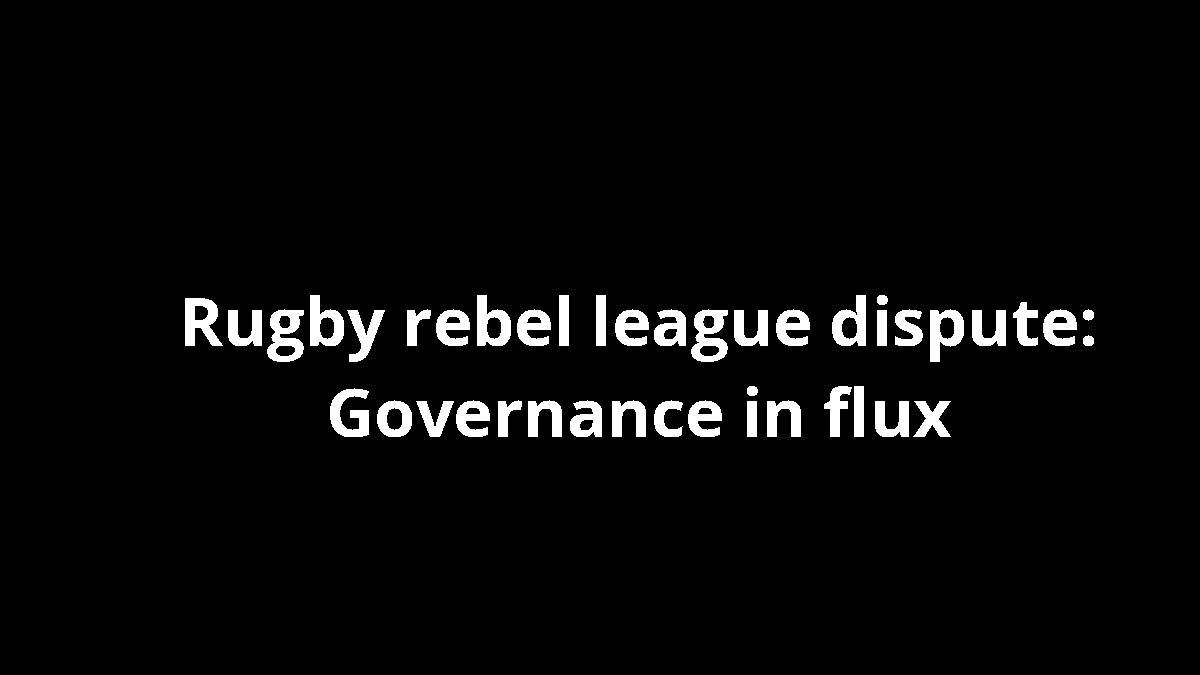Rugby rebel league dispute: Governance in flux
In Australia, the Rugby rebel league dispute has become a flashpoint for governance and ambition. Analysts note that the Rugby rebel league dispute is redefining how players move, clubs recruit, and broadcasters approach coverage. The Rugby rebel league dispute is not a single clash over a rulebook, but a broader reallocation of leverage across the sport. For players and fans, the Rugby rebel league dispute signals a turning point—between loyalty to traditional structures and the lure of new formats. Meanwhile governance bodies face questions about authority, enforceability, and open talent markets.
Beyond personal choices, the dispute tests governance over timelines and penalties. It touches clubs’ budgets, coaching plans, and the timing of TV deals. Sponsors watch closely as leverage shifts between on-field performance and governance. The ARLC says suspensions preserve the league’s integrity. R360 argues a broader talent pool can grow the market. Both sides want clarity for players, clubs, and fans. The broader debate involves broadcasters, rights owners, and stadium partners. Governance decisions now shape the game’s future in Australia. BBC Sport Rugby League and World Rugby offer context on governance models and industry standards.
Overview of the dispute
The dispute originated as R360 signalled a rebel competition that would operate alongside the ARLC-administered NRL, challenging the traditional gatekeepers of professional rugby league in Australia. The plan emphasized more game time for players, flexible schedules, and a potential shift in how talent is sourced and rewarded. Supporters argue that a rebel league could inject freshness, broaden markets, and test new formats in a high-stakes environment. Critics worry about fragmentation, revenue dilution, and fan confusion if rival leagues multiply. The debate has reverberated through boardrooms, stadiums, and broadcasters as stakeholders weigh risk and reward. For a wider look at governance implications, see analyses from World Rugby and ongoing media coverage at BBC Sport Rugby League.
Origins of the push
The push emerged from a group of players, promoters, and club executives seeking greater control over scheduling, revenue sharing, and contract terms. They argued that existing structures have bottlenecks that limit minutes, money, and mobility for top performers. The initiative aimed to create a separate ecosystem that could attract sponsors and broadcasters with novel formats and a different competitive arc. In public remarks, supporters framed the move as a legitimate response to market realities, not a destabilising break with tradition. The scale of the proposal remains contested, but the conversation has concentrated attention on governance and franchise rights.
R360’s response
R360 has publicly pushed back against the ARLC’s hardline stance. Leaders described the threats of decade-long suspensions as a warning that the code war is far from over. They insisted the rebel league challenge is about player development, meaningful game time, and a broader view of professional opportunity. The message to players has been clear: weigh options with care, as the landscape may shift quickly. The group’s messaging has sought to articulate a pro-competition case while emphasising the importance of safeguarding financial viability for clubs and broadcasters. For broader context on these dynamics, see coverage and analysis at BBC Sport Rugby League and related governance discussions at World Rugby.
Legal and strategic angles
Analysts describe a tense mix of contract law, regulatory compliance, and strategic negotiation. R360 has signalled it will pursue avenues to protect player mobility while challenging the scope of ARLC authority. The rebel group argues that players seek more minutes, better contracts, or a platform for alternative competition structures. Strategically, R360 has signalled a broader, more televised format and a potential shift in how talent pipelines feed the top level. Observers expect protracted discussions around anti-defection clauses, sanctions, and potential compromises that could preserve talent flow while preserving league integrity. For readers seeking policy context, governing bodies publish updates that guide franchise governance and player eligibility at World Rugby.
ARLC’s stance and rationale
The Australian Rugby League Commission has warned that joining the rebel venture could invite long suspensions, a policy framed as protecting the integrity of the existing competition and its revenue streams. The ARLC argues that a unified league structure is essential for broadcast deals, sponsorship, and fan trust. Officials stress the need for predictable competition calendars, licensing regimes, and clear penalties to deter defections. Public statements emphasise safeguarding the legacy and long-term health of the sport in Australia. The dispute thus raises questions about how far governance bodies will go to enforce unity and how flexible they can be when faced with alternative visions. See ongoing coverage at BBC Sport Rugby League for quotes and timelines.
Enforcement and precedent
Enforcement mechanisms are under scrutiny as observers weigh precedent. Decade-long suspensions would set a strong signal, but may also trigger legal and financial challenges for clubs and players. ARLC officials argue that clear consequences deter defections and preserve current revenue streams. Critics warn that harsh penalties could deter talent or drive defections underground. The debate also touches on how such sanctions would apply across different leagues, including potential cross-border moves. Regulators are likely to seek a careful balance between deterrence and fair play, informed by governance standards published by bodies like World Rugby.
Implications for players and clubs
The rebel league dispute places players in a direct position to choose between stability and opportunity. For some, more game time and higher immediate earnings can trump loyalty to a single competition. For clubs, the dynamics hinge on talent retention, sponsorship alignment, and the risk of audience fragmentation. Stakeholders are weighing the impact on development pathways, academy pipelines, and international exposure. As the dispute unfolds, players and clubs will look to unions, managers, and agents for guidance. The broader implications touch on how talent is cultivated, retained, and rewarded in an evolving landscape. See ongoing discussions around player welfare and governance at World Rugby and industry reporting at BBC Sport Rugby League.
Talent pipeline and sponsorship
Talent pipelines could face a shift if pathways split between traditional clubs and rebel formats. Sponsors weigh brand alignment with a potential fragmented audience and the risk of cannibalising existing rights packages. Clubs worry about funding cycles, stadium logistics, and fan engagement across multiple leagues. Players may gain leverage in contract negotiations, but they also confront uncertainty during a transitional period. The end state could be a more segmented market, with hybrid deals or bilateral agreements that keep players visible to top clubs while accommodating new formats.
Industry and governance implications
Industry observers say the dispute could accelerate governance reforms, broadcasting clarity, and regulatory alignment. There is talk of clarifying eligibility, licensing, and cross-league participation rules to prevent chaos while allowing experimentation. If the rebel league gains traction, governing bodies may respond with new frameworks that preserve competitive balance, ensure fair revenue sharing, and protect fan interests. The broader question is how governance evolves in a sport that must balance tradition with innovation. Industry experts urge careful calibration of rules to maintain coherence across leagues and markets. See governance briefs from World Rugby and ongoing industry analysis via BBC Sport Rugby League.
Regulatory clarity and broadcast deals
Regulatory clarity is emerging as a focal point. If new formats emerge, regulators will need to harmonise licensing, broadcast rights, and anti-defection provisions. Clear rules help attract broadcasters and sponsors by reducing uncertainty. Meanwhile, broadcast partners are watching the dispute’s trajectory to decide on investment levels and rights timelines. The sector may see enhanced co-operation agreements or staged introductions of rebel elements to minimize disruption while preserving audience trust. Analysts expect continued dialogue among ARLC, clubs, players, and media partners to shape the governance framework.
What happens next
Predicting the next moves is difficult as negotiations unfold in public and behind closed doors. Possible paths include a negotiated settlement that preserves some rebel features within a unified league or a long-term constitutional revision that adjusts the balance of power among clubs, players, and the governing body. Another possibility is regulatory clarifications that allow controlled experimentation with formats, scheduling, and revenue sharing without fully fragmenting the ecosystem. Observers will be watching for progress on penalties, roster rules, and licensing decisions, all of which influence the sport’s direction. For readers tracking developments, BBC and World Rugby provide ongoing coverage and policy context.
Outlook and timelines
Timelines for decisions remain fluid. Insiders expect a series of public statements, stakeholder meetings, and perhaps interim triggers that keep the debate constructive while progress is made. The coming months could see compromises around player mobility, revenue allocation, and format trials designed to test viability without jeopardising existing ecosystems. Fans should anticipate incremental policy shifts rather than a single sweeping reform. In this evolving landscape, the Rugby rebel league dispute will likely stay in the news as governance, business, and on-field drama intersect.


